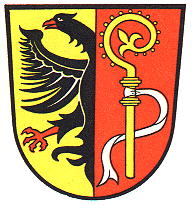Biberach (kreis): Difference between revisions
Jump to navigation
Jump to search
Knorrepoes (talk | contribs) m (Text replace - "|width="15%"|50 px|right |} " to "|width="15%"|50 px|right |}<seo title="Wappen, Gemeindewappen" /> ") |
Knorrepoes (talk | contribs) m (Text replace - "[[Literature" to "{{media}} [[Literature") |
||
| Line 17: | Line 17: | ||
The Imperial eagle is derived from the arms of the city of [[Biberach]], and symbolises the city as well as a number of former Imperial Estates in the district. The crosier is a symbol for the many possessions of some monasteries, such as the Salem Abbey, in the district prior to 1803. | The Imperial eagle is derived from the arms of the city of [[Biberach]], and symbolises the city as well as a number of former Imperial Estates in the district. The crosier is a symbol for the many possessions of some monasteries, such as the Salem Abbey, in the district prior to 1803. | ||
{{media}} | |||
[[Literature]] : Stadler, 1964-1971, 8 volumes: Lindner and Olzog, 1996. | [[Literature]] : Stadler, 1964-1971, 8 volumes: Lindner and Olzog, 1996. | ||
Revision as of 18:55, 8 July 2014
| Heraldry of the World Civic heraldry of Germany - Deutsche Wappen (Gemeindewappen/Kreiswappen) |
BIBERACH (BC)
State : Baden-Württemberg
Additions : 1973 Saulgau
Origin/meaning
The arms were granted on March 4, 1970, and confirmed on September 3, 1973.
The Imperial eagle is derived from the arms of the city of Biberach, and symbolises the city as well as a number of former Imperial Estates in the district. The crosier is a symbol for the many possessions of some monasteries, such as the Salem Abbey, in the district prior to 1803.
Contact and Support
Partners:
Your logo here ?
Contact us
© since 1995, Heraldry of the World, Ralf Hartemink 
Index of the site
Literature : Stadler, 1964-1971, 8 volumes: Lindner and Olzog, 1996.











